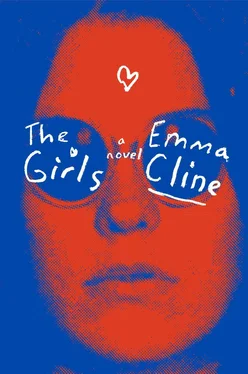My mother stopped enforcing regular mealtimes, leaving grapes in a colander in the sink or bringing home glass jars of dilled miso soup from her macrobiotic cooking class. Seaweed salads dripping with a nauseating amber oil. “Eat this for breakfast every day,” she said, “and you’ll never have another zit.”
I cringed, pulling my fingers away from the pimple on my forehead.
There had been many late-night planning sessions between my mother and Sal, the older woman she had met in group. Sal was endlessly available to my mother, coming over at odd hours, impatient for drama. Wearing tunics with mandarin collars, her gray hair cut short so her ears showed, making her look like an elderly boy. My mother spoke to Sal about acupuncture, of the movement of energies around meridian points. The charts.
“I just want some space,” my mother said, “for me. This world takes it out of you, doesn’t it?”
Sal shifted on her wide rear, nodded. Dutiful as a bridled pony.
My mother and Sal were drinking her woody tea from bowls, a new affectation my mother had picked up. “It’s European,” she’d said defensively, though I had said nothing. When I walked through the kitchen, both women stopped talking, but my mother cocked her head. “Baby,” she said, gesturing me closer. She squinted. “Part your bangs from the left. More flattering.”
I’d parted my hair that way to cover the pimple, gone scabby from picking. I’d coated it with vitamin E oil but couldn’t stop myself from messing with it, flaking on toilet paper to soak up the blood.
Sal agreed. “Round face shape,” she said with authority. “Bangs might not be a good idea at all, for her.”
I imagined how it would feel to topple Sal over in her chair, how her bulk would bring her down fast. The bark tea spilling on the linoleum.
They quickly lost interest in me. My mother rekindling her familiar story, like the stunned survivor of a car accident. Dropping her shoulders as if to settle even further into the misery.
“And the most hilarious part,” my mother went on, “the part that really gets me going?” She smiled at her own hands. “Carl’s making money,” she said. “That currency stuff.” She laughed again. “Finally. It actually worked. But it was my money that paid her salary,” she said. “My mother’s movie money. Spent on that girl.”
—
My mother was talking about Tamar, the assistant my father had hired for his most recent business. It had something to do with currency exchange. Buying foreign money and trading it back and forth, shifting it enough times so you were left, my father insisted, with pure profit, sleight of hand on a grand scale. That’s what the French language tapes in his car had been for: he’d been trying to push along a deal involving francs and lire.
Now he and Tamar were living together in Palo Alto. I’d only met her a few times: she’d picked me up from school once, before the divorce. Waving lazily from her Plymouth Fury. In her twenties, slim and cheerful, Tamar constantly alluded to weekend plans, an apartment she wished were bigger, her life textured in a way I couldn’t imagine. Her hair was so blond it was almost gray, and she wore it loose, unlike my mother’s smooth curls. At that age I looked at women with brutal and emotionless judgment. Assessing the slope of their breasts, imagining how they would look in various crude positions. Tamar was very pretty. She gathered her hair up in a plastic comb and cracked her neck, smiling over at me as she drove.
“Want some gum?”
I unwrapped two cloudy sticks from their silver jackets. Feeling something adjacent to love, next to Tamar, thighs scudding on the vinyl seat. Girls are the only ones who can really give each other close attention, the kind we equate with being loved. They noticed what we want noticed. And that’s what I did for Tamar — I responded to her symbols, to the style of her hair and clothes and the smell of her L’Air du Temps perfume, like this was data that mattered, signs that reflected something of her inner self. I took her beauty personally.
When we arrived home, the gravel crackling under the car wheels, she asked to use the bathroom.
“Of course,” I said, vaguely thrilled to have her in my house, like a visiting dignitary. I showed her the nice bathroom, by my parents’ room. Tamar peeked at the bed and wrinkled her nose. “Ugly comforter,” she said under her breath.
Until then, it had just been my parents’ comforter, but abruptly I felt secondhand shame for my mother, for the tacky comforter she had picked out, had even been foolish enough to be pleased by.
I sat at the dining table listening to the muffled sound of Tamar peeing, of the faucet running. She was in there a long time. When Tamar finally emerged, something was different. It took me a moment to realize she was wearing my mother’s lipstick, and when she noticed me noticing her, it was as if I’d interrupted a movie she was watching. Her face rapt with the presentiment of some other life.
—
My favorite fantasy was the sleep cure I had read about in Valley of the Dolls. The doctor inducing long-term sleep in a hospital room, the only answer for poor, strident Neely, gone muddy from the Demerol. It sounded perfect — my body kept alive by peaceful, reliable machines, my brain resting in watery space, as untroubled as a goldfish in a glass bowl. I’d wake up weeks later. And even though life would slot back into its disappointing place, there would still be that starched stretch of nothing.
Boarding school was meant to be a corrective, the push I needed. My parents, even in their separate, absorbing worlds, were disappointed in me, distressed by my mediocre grades. I was an average girl, and that was the biggest disappointment of all — there was no shine of greatness on me. I wasn’t pretty enough to get the grades I did, the scale not tipping heartily enough in the direction of looks or smarts. Sometimes I would be overtaken with pious impulses to do better, to try harder, but of course nothing changed. Other mysterious forces seemed to be in play. The window near my desk left open so I wasted math class watching the shudder of leaves. My pen leaking so I couldn’t take notes. The things I was good at had no real application: addressing envelopes in bubble letters with smiling creatures on the flap. Making sludgy coffee I drank with grave affect. Finding a certain desired song playing on the radio, like a medium scanning for news of the dead.
My mother said I looked like my grandmother, but this seemed suspicious, a wishful lie meant to give false hope. I knew my grandmother’s story, repeated like a reflexive prayer. Harriet the date farmer’s daughter, plucked from the sunburned obscurity of Indio and brought to Los Angeles. Her soft jaw and damp eyes. Small teeth, straight and slightly pointed, like a strange and beautiful cat. Coddled by the studio system, fed whipped milk and eggs, or broiled liver and five carrots, the same dinner my grandmother ate every night of my childhood. The family holing up in the sprawling ranch in Petaluma after she retired, my grandmother growing show roses from Luther Burbank cuttings and keeping horses.
When my grandmother died, we were like our own country in those hills, living off her money, though I could bicycle into town. It was more of a psychological distance — as an adult, I would wonder at our isolation. My mother tiptoed around my father, and so did I — his sideways glances at us, his encouragements to eat more protein, to read Dickens or breathe more deeply. He ate raw eggs and salted steaks and kept a plate of beef tartare in the refrigerator, spooning out bites five or six times a day. “Your outer body reflects your inner self,” he said, and did his gymnastics on a Japanese mat by the pool, fifty push-ups while I sat on his back. It was a form of magic, being lifted into the air, cross-legged. The oat grass, the smell of the cooling earth.
Читать дальше












